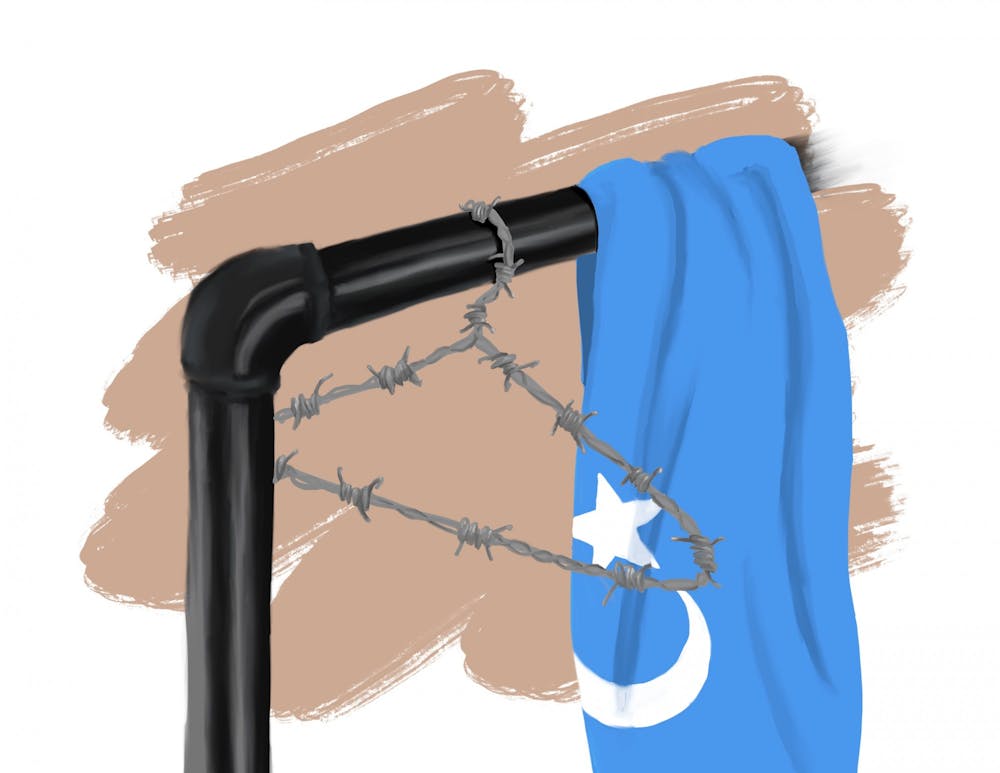The next time you find yourself checking out the racks of a fast fashion retail franchise, take a moment to be more conscious of how you choose to spend your money.
A report from the Australian Strategic Policy Institute published earlier this year alleged that about 83 major clothing brands—including L Brands’ Victoria’s Secret, Abercrombie & Fitch, H&M, Adidas, Nike, Muji, and Uniqlo—are complicit in the forced labor and human rights violations of Uyghur workers detained in centers outside of Xinjiang, China. A number of factories are using the labor of up to 1.8 million imprisoned Uyghurs and other Turkic Muslims to produce cotton and yarn under a state–sponsored labor transfer scheme.
Nike, for one, works with Qingdao Tae Kwang Shoes Co. Ltd.—a company that since January 2020 has exploited the labor of about 600 Uyghurs. During the day, the workers make shoes. At night, they attend school, sing the Chinese national anthem, and take patriotic education classes–a mirror image of Xinjiang’s so–called re–education camps. Though one may argue that these workers are given education, Uyghurs participating in these programs very rarely do so voluntarily.
This community has been uprooted from their homes and taken to these factories to subsequently endure long working hours in poor conditions. Uyghurs are often abused by their bosses and discriminated against by their Han counterparts. These labor camps are akin to slave labor camps, if they aren't classified as such already. According to a CSIS report, Uyghurs are detained for growing a beard, international travel, and WhatsApp usage, leading them to face omnipresent surveillance.
Despite the fact that these companies employing unethical labor practices are complicit in breaching labor laws, big corporations are often too powerful to face real consequences. They are allowed to continue to source cotton and yarn produced by these forced labor camps without any government restrictions.
Thus, effective change must start with individuals who have the means to be more conscious of their purchases. And while buying solely from sustainable and ethical brands is not accessible for everyone, taking the time to educate yourself on how your clothes are made and paying more attention to where your wardrobe comes from is a meaningful first step.
Here are some avenues to consider when making your next garment purchase:
- Companies often turn to cheap labor outside of the U.S. Therefore, checking where a garment was made and doing your research on whether the brand has a history of working with suppliers that use unethical labor practices can help you make an informed purchase.
- For the time being, several organizations have even recommended that people cease buying imported clothes from China, if they can, in order to push forth change for the Uyghur community.
Closely tied to the abuse of laborers by the garment industry is the exploitation of the environment. Here are several things that you can consider to ensure that your clothing purchases are eco–friendly:
- Many garments produced today are synthetic, and when cleaned in a washer and dryer they break down into microplastics. These then pollute waterways and find their way to our supply of drinking water, the food we eat, and the air we breathe. Check the composition for natural fibers, such as cotton, wool, silk, or linen.
- Do not just rely on the brand’s reputation for selling nicely fitted items. If you can, try clothes on before purchasing to avoid consuming goods that you will ultimately not be able to wear.
- Even then, ask yourself if you have purchased something similar already. This mode of thinking has the power to decrease your individual consumption and ecological impact.
While this article is pointed towards the effects of the garment industry on Uyghurs, there are many other communities around the world that suffer under unethical labor practices. I encourage you to spend wisely, and even thrifting might be a good option—for the environment, or for the people.

